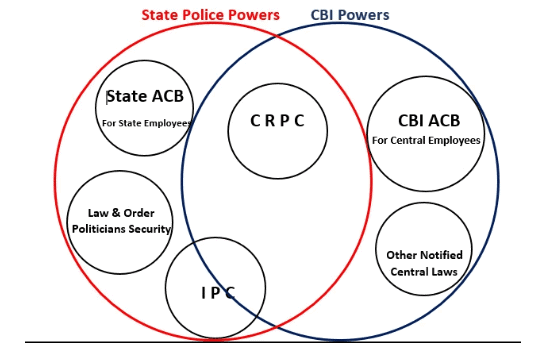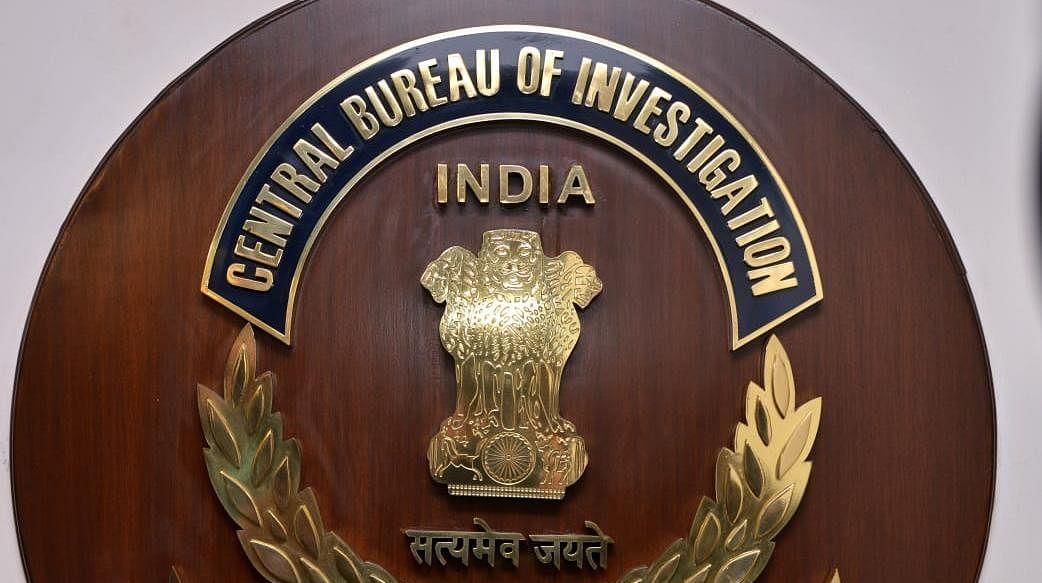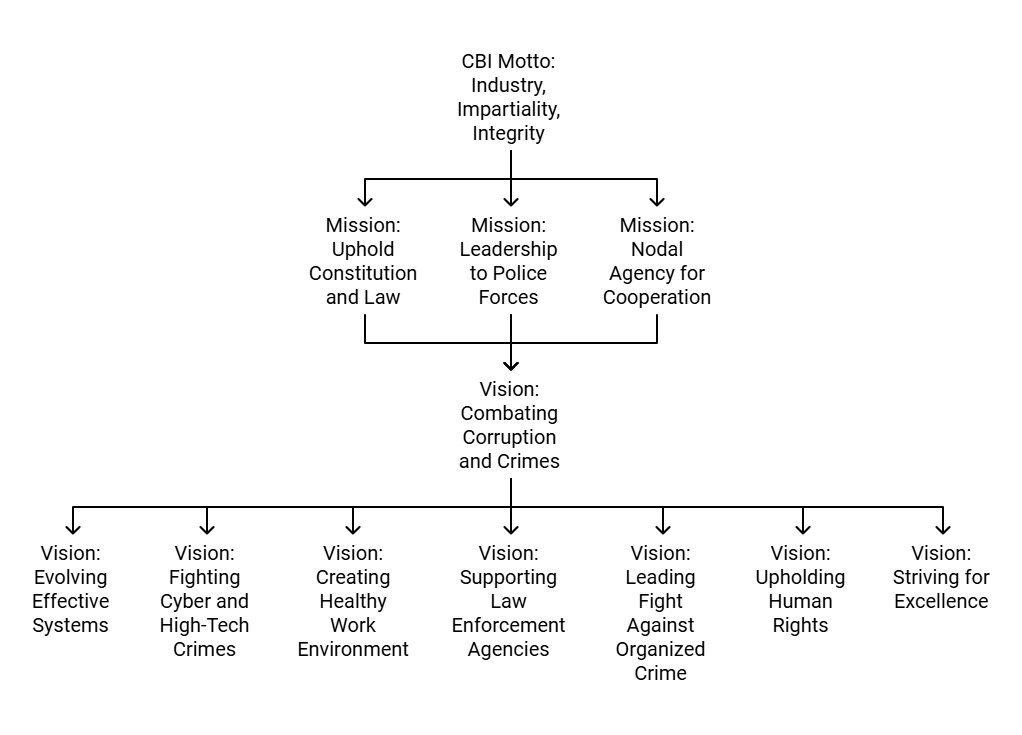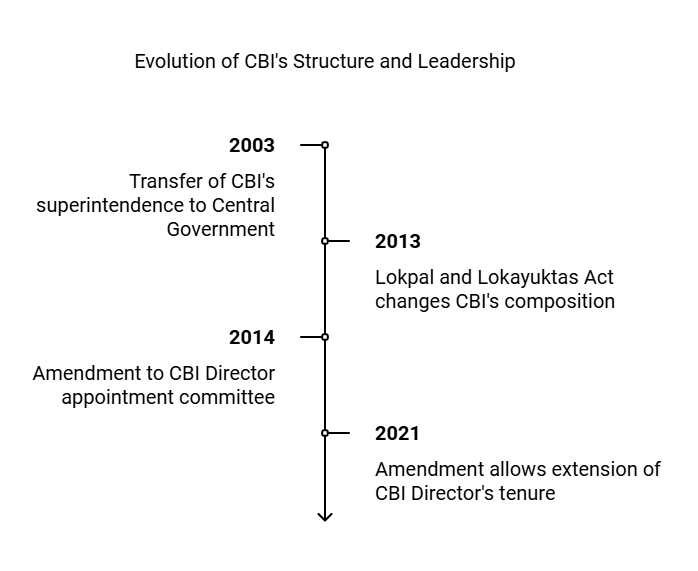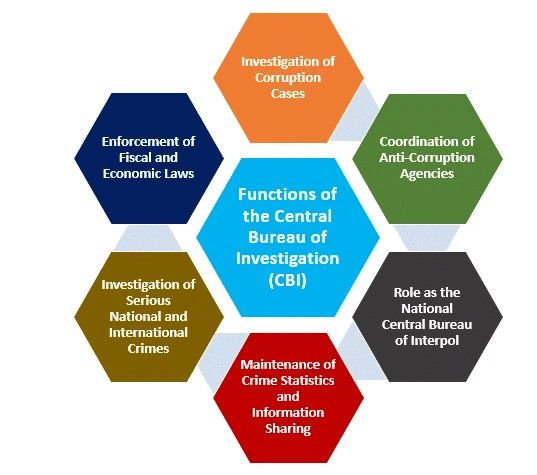Establishment
The Central Bureau of Investigation (CBI) began as the Special Police Establishment in 1941, created by the Government of India. It was set up to investigate bribery and corruption related to the War and Supply Department during World War II.
- The Special Police Establishment was controlled by the War and Supply Department. After the war ended, there was still a need for an agency to handle bribery and corruption involving Central Government employees.
- In 1946, the Delhi Special Police Establishment Act was passed. This Act transferred control of the Special Police Establishment to the Home Department and expanded its functions to cover all government departments.
- In 1963, the CBI was officially established through a decision by the Ministry of Home Affairs. The Delhi Special Police Establishment was merged with the CBI and became one of its divisions.
- Later, the CBI was moved under the Ministry of Personnel, where it functions today.
- The CBI is not a statutory body; it gets its powers from the Delhi Special Police Establishment Act, 1946.
- The CBI is the main agency for investigations related to corruption, economic crimes, and serious organized crimes. It helps in maintaining integrity in the government and works with the Central Vigilance Commission and Lokpal.
- The CBI does not investigate terrorism-related cases; that’s the job of the National Investigation Agency (NIA). The NIA was formed after the 2008 Mumbai terror attacks to investigate terrorism, terror funding, and related crimes.
- The CBI cannot exercise its powers in a state without the consent of that state’s government (except in railway areas). The CBI can only investigate in a state if the state government agrees.
Motto, Vision and Mission
The motto, mission, and vision of the CBI are as follows:

Motto:
Industry, Impartiality, and Integrity
Mission:
- To uphold the Constitution of India and the law of the land through thorough investigations and successful prosecution of offences.
- To provide leadership and direction to police forces.
- To act as the nodal agency for enhancing interstate and international cooperation in law enforcement.
Vision:
Based on its motto and mission, and the need to develop professionalism, transparency, adaptability to change, and the use of science and technology, the CBI will focus on:
- Combating corruption in public life and curbing economic and violent crimes through careful investigation and prosecution.
- Evolving effective systems and procedures for successful investigations and prosecutions in law courts.
- Helping fight cybercrime and high-tech crimes.
- Creating a healthy work environment that encourages teamwork, free communication, and mutual trust.
- Supporting state police organizations and law enforcement agencies in national and international cooperation, especially in the investigation of cases.
- Playing a lead role in the fight against national and transnational organized crime.
- Upholding human rights and protecting the environment, arts, antiques, and heritage.
- Developing scientific thinking, humanism, and the spirit of inquiry and reform.
- Striving for excellence and professionalism in all functions to achieve high levels of success and achievement.
Question for Laxmikanth Summary: Central Bureau of Investigation
Try yourself:
What is the main role of the Central Bureau of Investigation (CBI)?Explanation
- The main role of the CBI is to investigate corruption, economic crimes, and serious organized crimes to maintain integrity within the government and uphold the law of the land.
Report a problem
Composition
The CBI is headed by a Director, who is assisted by special directors, additional directors, joint directors, deputy inspector generals, superintendents of police, and other police personnel, including forensic scientists and law officers.
The Director, also known as the Inspector-General of Police, Delhi Special Police Establishment, is responsible for the administration of the CBI. After the CVC Act, 2003, the superintendence of the Delhi Special Police Establishment was transferred to the Central Government, except for investigations under the Prevention of Corruption Act, 1988, which are overseen by the Central Vigilance Commission.
The Lokpal and Lokayuktas Act, 2013 made changes to the composition of the CBI:
- The Central Government appoints the Director of CBI based on the recommendation of a three-member committee, which includes the Prime Minister (Chairperson), the Leader of the Opposition in the Lok Sabha, and the Chief Justice of India or a nominated Supreme Court judge.
- A Directorate of Prosecution is created to handle cases under the Lokpal and Lokayuktas Act, 2013. The Director of Prosecution works under the overall supervision of the Director of CBI and is appointed by the Central Government on the recommendation of the Central Vigilance Commission.
- The Central Government appoints officers ranked SPand above in the CBI, based on a committee that includes the Central Vigilance Commissioner (Chairperson), Vigilance Commissioners, the Home Ministry Secretary, and the Department of Personnel Secretary.
In 2014, the Delhi Special Police Establishment (Amendment) Act changed the committee for the appointment of the CBI Director. If there is no recognized Leader of Opposition in the Lok Sabha, the leader of the largest opposition party in the Lok Sabha would be part of the committee.
In 2021, the Delhi Special Police Establishment (Amendment) Act allowed the Director's tenure to be extended. The Director's tenure, originally fixed at two years, can now be extended up to five years by the Central Government. However, the extension can only be done annually and cannot exceed five years in total, including the initial two-year appointment. Extensions can be granted for public interest reasons, on the recommendation of the initial appointment committee, and with reasons recorded in writing.
|
|
Download the notes
Laxmikanth Summary: Central Bureau of Investigation
|
Download as PDF
|
Functions
The functions of the CBI are as follows:
- Investigating cases of corruption, bribery, and misconduct by Central government employees.
- Investigating cases related to violations of fiscal and economic laws, such as export/import control, customs, central excise, income tax, and foreign exchange regulations. These cases are handled in consultation with or at the request of the concerned department.
- Investigating serious crimes committed by organized gangs of professional criminals, with national and international implications.
- Coordinating the activities of anti-corruption agencies and various state police forces.
- Taking up cases of public importance for investigation at the request of a state government.
- Maintaining crime statistics and sharing criminal information.
The CBI is a multidisciplinary investigation agency that handles cases of corruption, economic offences, and conventional crimes. It generally focuses on anti-corruption cases involving Central Government employees, Union Territories, and their public sector undertakings. It handles conventional crimes like murder, kidnapping, and rape on reference from state governments or when directed by the Supreme Court/High Courts.
The CBI also acts as the "National Central Bureau" of Interpol in India. Its Interpol Wing coordinates investigation-related activities between Indian law enforcement agencies and Interpol member countries.
Question for Laxmikanth Summary: Central Bureau of Investigation
Try yourself:
Which committee is responsible for recommending the appointment of the Director of CBI?Explanation
- The committee responsible for recommending the appointment of the Director of CBI consists of the Prime Minister, the Leader of the Opposition in the Lok Sabha, and the Chief Justice of India.
- This committee ensures a fair and balanced selection process for the leadership of the CBI.
Report a problem
Provision of Prior Permission
- The CBI needs prior approval from the Central Government to investigate offences committed by officers of the rank of joint secretary and above in the Central Government and its authorities.
- In 2014, the Supreme Court ruled that the legal provision requiring prior sanction for CBI investigations against senior bureaucrats in corruption cases under the Prevention of Corruption Act was invalid.
- The Court’s Constitution Bench declared that Section 6A of the Delhi Special Police Establishment Act, which protected officers of the rank of joint secretary and above from facing even a preliminary inquiry by the CBI in corruption cases, violated Article 14 of the Constitution.
- The Chief Justice of India stated that corruption is a national threat, and tracking down and punishing corrupt public servants, regardless of their rank, is essential under the Prevention of Corruption Act, 1988.
- The judgment emphasized that the status of a public servant does not exempt them from equal treatment, and all officers, regardless of rank, should undergo the same process of inquiry and investigation.
|
|
Take a Practice Test
Test yourself on topics from UPSC exam
|
Practice Now
|
CBI VS State Police

- The role of the Delhi Special Police Establishment (DSPE), a division of the CBI, is supplementary to that of the state police forces.
- Both the DSPE and state police forces have concurrent powers for investigating and prosecuting offences under the Delhi Special Police Establishment Act, 1946.
- To prevent duplication and overlap of cases between these two agencies, the following administrative arrangements have been made:
(a)The DSPE will handle cases primarily related to the Central Government's affairs or employees, even if they also involve certain state government employees.
(b)The state police force will handle cases primarily related to the state government's affairs or employees, even if they also involve certain Central Government employees.
(c)The DSPE will also take up cases against employees of public undertakings or statutory bodies established and financed by the Central Government.
